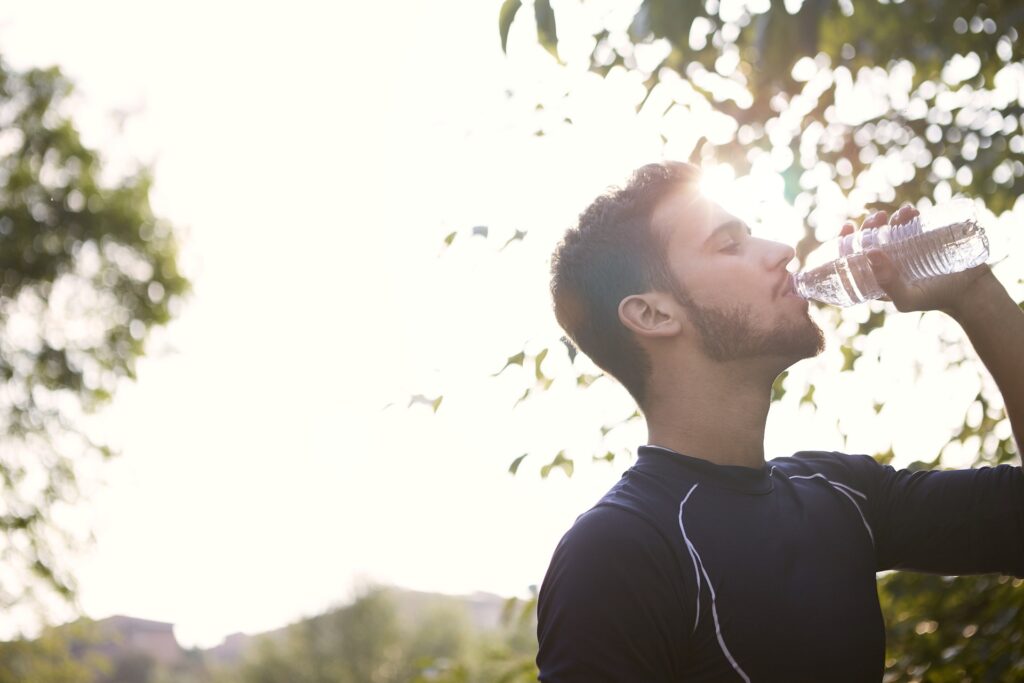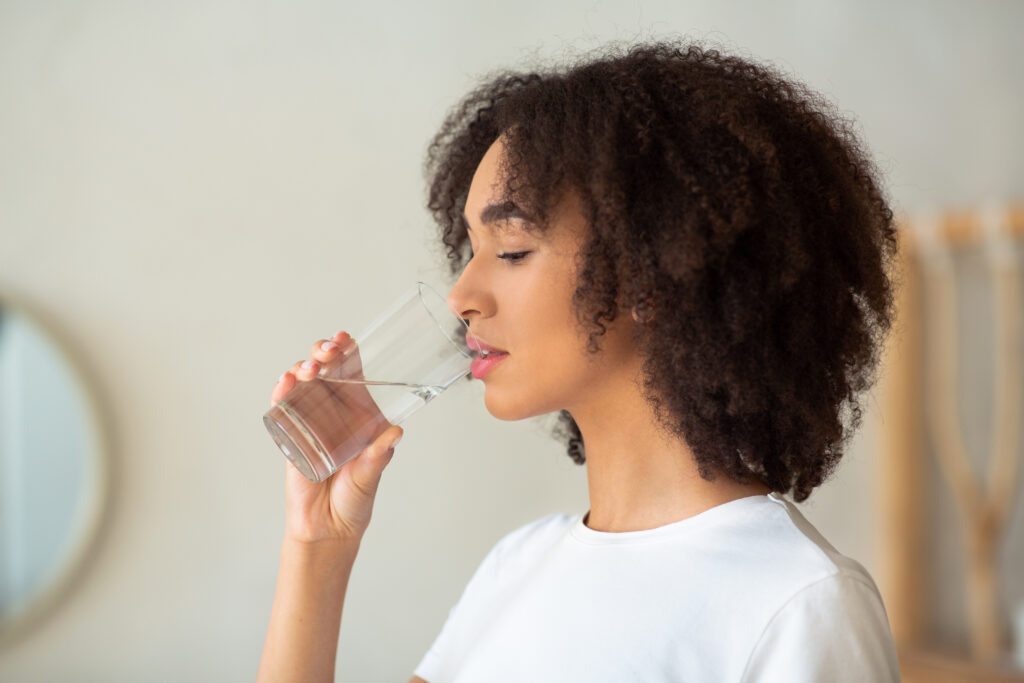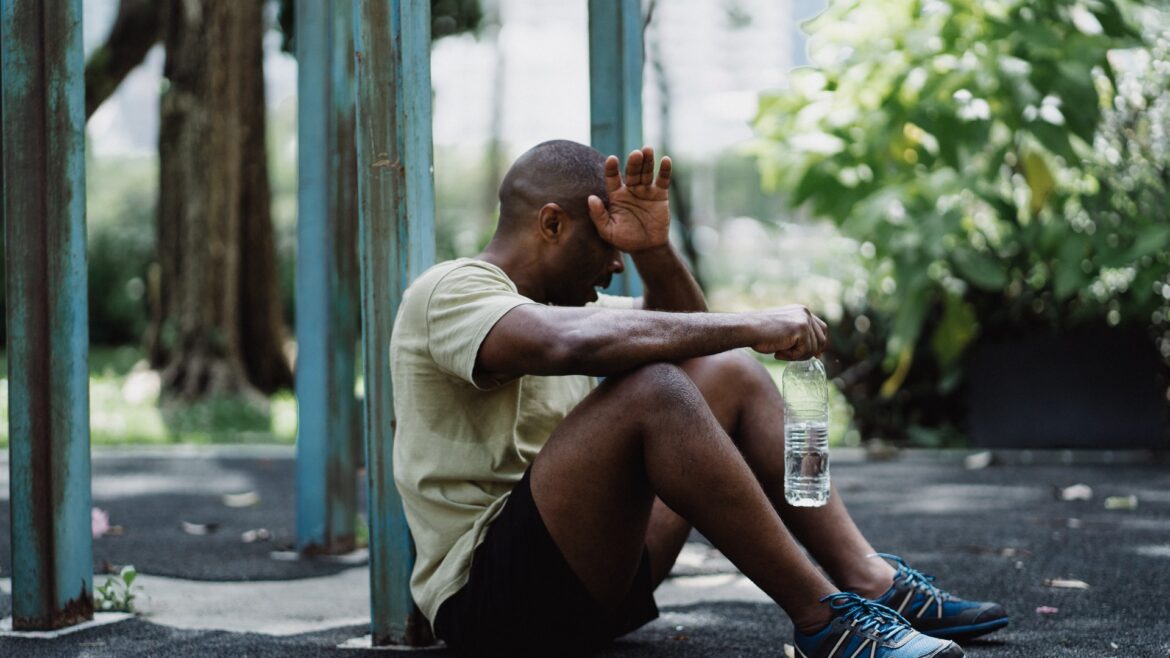60% of our body is made up of water, but when we’re enjoying our favorite outdoor summer activities, all the water inside of us won’t be enough to keep us hydrated. Summer activities and sweltering heat lead our bodies to lose more fluids than normal — through our sweat. If you don’t replace the moisture that your body is losing, you can eventually become dehydrated.
Hydration is the body’s first defense in maintaining good health, especially as we age. Water isn’t just to parch thirst — it’s critical for our muscles, bones, tissue, and organs. That’s why we are regularly told to drink at least 8 glasses of water a day. In reality, this is an arbitrary number; some bodies might need more and some bodies might need less depending on all different factors.
Let’s dig into what it looks like to be hydrated and dehydrated so you can find the proper amount of water intake for you, your body, and your summer activity levels.

Is your body hydrated or dehydrated? Know the signs
Water is never a bad idea. And while it may feel better to cool off from the scorching summer sun with an ice-cold soda, alcoholic beverage, or juice, these beverages won’t provide anything in the way of hydration. In actuality, they’ll just quench your thirst momentarily while causing further dehydration.
The key is to drink enough plain old water to hydrate your body properly. Whether that’s 8 glasses of water or 12, your body will also give you signs that you are properly hydrated. These include:
- Improved brain performance and function
- Reliable digestive harmony
- Decreased/eliminated joint pain
- More energy
- Weight management
- And so many more!
When you’re dehydrated, though, your body will begin to show warning signs, some more obvious than others. Some of the dehydration dangers that you should look out for include:
- Muscle cramps – When you become dehydrated your body can no longer send water to your muscles, causing them to be more likely to constrict and cramp involuntarily due to hypersensitivity.
- Constipation – Dehydration will make it harder for your body to break down food as it moves through your intestines. Because your body is in panic mode, it will start extracting what liquids it can from the food waste, essentially making it harder to move through your body.
- Depression – Dehydration doesn’t just affect your body, it also affects your mind. Your brain requires the most water out of any other part of your body (your brain is made up of 85% water). When there’s a deficiency in that water supply, your brain will lack the energy it needs to fight fatigue and, yes, depressive thoughts from occurring.
- Color of your urine- If your urine is a dark yellow, this means that you are dehydrated. In other words, your kidneys are retaining water from being excreted (peeing it out), in order to keep the body hydrated. This is why the urine is concentrated. The goal is to have your urine be a slight yellow color, not dark yellow and not clear.

The importance of electrolytes in staying hydrated
Electrolytes are minerals found in your blood, sweat, and urine. The minerals are dissolved in fluid and form into electrolytes – which are the positive or negative ions used in metabolic processes (turning food into energy).
There are several different types of electrolytes found in the body that are responsible for keeping up with important bodily functions, including nerve and muscle function, acid-base maintenance, and keeping you hydrated.
Within your body, you have electrolytes like sodium, potassium, chloride, calcium, magnesium, phosphate, and bicarbonate. Of these, sodium is the most important to the process of staying hydrated.
Without the proper amount of sodium, your body cannot maintain fluid balance (your kidneys are in charge of this) — because sodium is needed to carry H2O across our cell membranes. Remember high school biology? This process is called osmosis.
Without osmosis, your body doesn’t know which cells to send water to and which ones need to be filtered through. Without this information, cells are at risk to either burst from too much water or to shrink due to dehydration.
The most common cause of electrolyte imbalance is dehydration caused by extreme heat exposure (other causes include being physically ill, like vomiting or diarrhea). Electrolyte imbalance can be anywhere from mild to fatal, which is a scale that should be taken seriously.
Side effects of an electrolyte imbalance include:
- Fatigue (this is the most common)
- Irregular heartbeat
- Muscle cramping
- Headaches
- Convulsions
This delicate balance happening within your body is not something you want to challenge. Electrolytes are more than just a word you read on a bottle of Gatorade — they can impact your health and wellbeing.

How to rehydrate with food and water
Dehydration during the summer doesn’t have to happen. While sweating is great for removing toxins from our body and even proving that we’re getting a great cardio workout, sweating too much is not necessarily a good thing. You’ll need to replenish everything you sweat out by drinking water (no, drinking a Gatorade after a workout isn’t necessarily what your body needs!).
If you are sweating or intensely working out for over an hour, supplementing electrolytes is recommended. We often use nuun tablets (less sugar) after completion of exercising for an hour, or Liquid IV if you are continuing to exercise over an hour because it has sugar (glucose) to help provide extra energy to keep moving.
How much water should you drink?
By taking half of your body weight and turning that number into fluid ounces, you have the perfect amount of water that your body needs to operate at functioning capacity at a baseline.
You’ll also want to consider your activity level or heat outside. Whether you’re playing sand volleyball one day or walking outside another, you should add 12 ounces of water to your daily water intake for every 15-20 minutes you work out or are sweating in this Texas heat!
Water-rich food sources
However, hydration doesn’t only have to be about incorporating your 8 (or more) glasses of water into your day. You can also include more water-rich foods in your diet. Summer fruits such as watermelons, strawberries, cantaloupe, and peaches are great water-rich options for snacking during hotter months. Most vegetables also fall into this category, too, with the top three water-rich veggies being cucumbers, lettuce, and celery.

Active all year-round? We want to help.
We know that, for many people, summer is a very active season. Alongside dehydration comes the risk of injuries, from muscle strains to unidentified pain and even bone breaks or ligament injuries.
Here at ResilientRX, we believe that you can recover from your injuries — and even prevent future injuries with the help of a physical therapist.
When working with one of our Doctors of Physical Therapy, you will undergo a comprehensive evaluation that will look beyond one body part and assess multiple regions that may be contributing to the problem. We’ll talk about your activity levels, hydration and diet, history of injury, and more.
Your physical therapist will walk you through every step of the assessment and will ensure you feel comfortable, but push you when needed during each treatment session.
If you want to make sure you can stay active and strong throughout the year, now’s the perfect time to start working with a performance-focused physical therapist. Learn more about our PT services for athletes and active folks here.
And remember, all of this is general advice, please consult your physician if you have any questions about whether or not these supplement suggestions are right for you.


